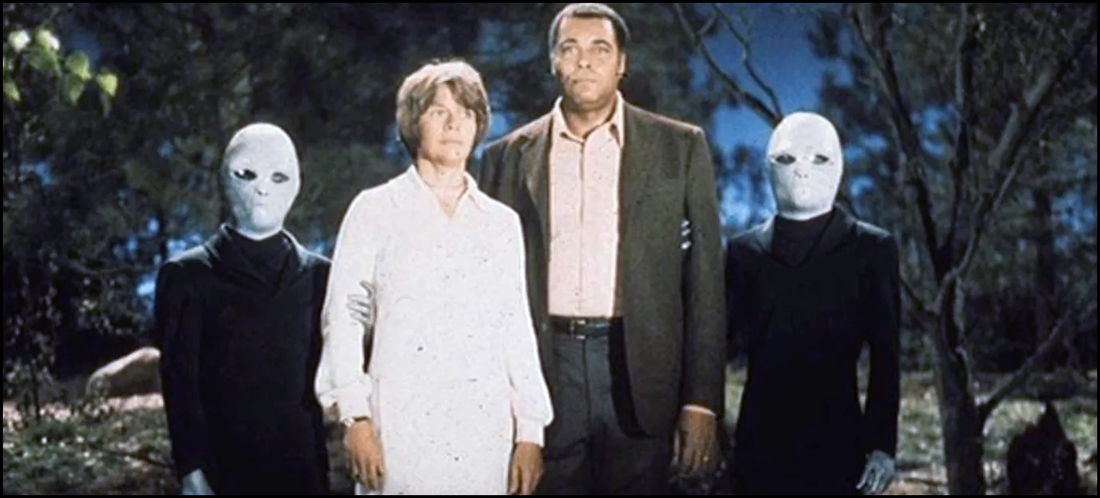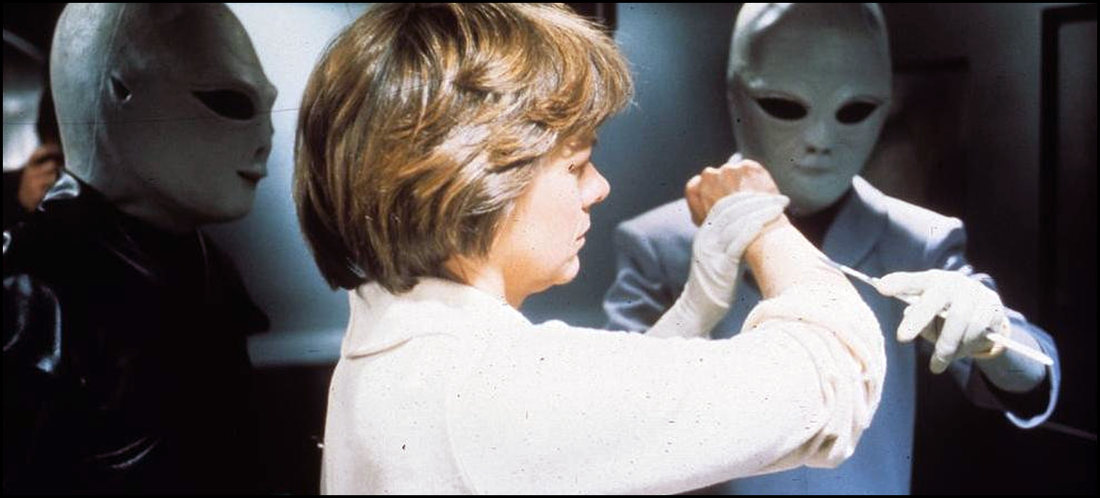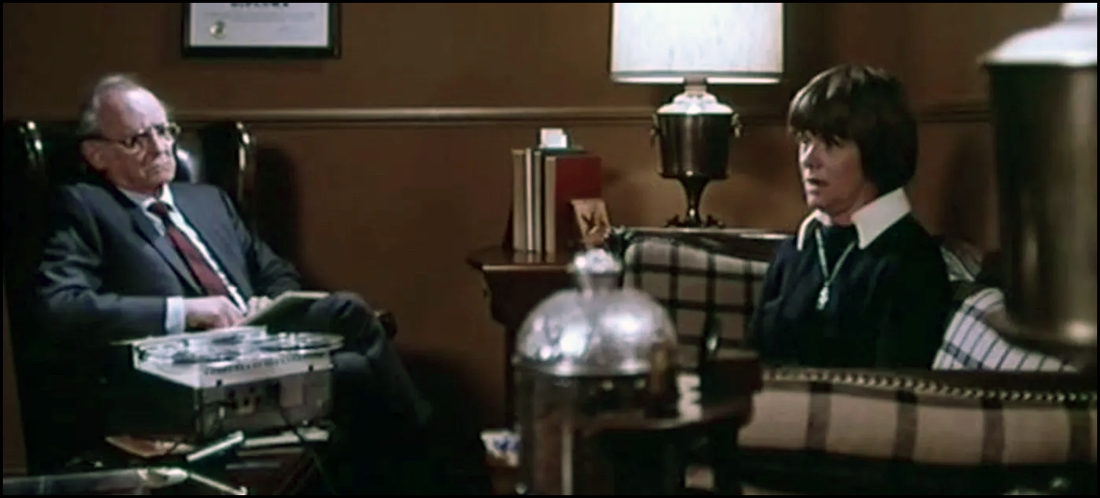Unlike others, I don’t feel any compunction to debate their authenticity because my capacity for appreciating things that go bump in the night isn’t limited to whether or not I can prove what made said ‘bump.’ In some ways, I find exploring generally weird phenomena like watching a movie: I never quite see where it comes from, so I can sit back and enjoy the ride while it all unspools. UFOs are real – they’re captured on radar every day – and it’s only their explanation that changes; sometimes, this is because we learn more about the circumstances that led up to their discovery, while other times they end up being classified as legitimately ‘unknown.’
Over the years, there have been a few good docudramas that have explored matters of the occult, the supernatural, and the paranormal. 1993’s award-nominated Fire In The Sky (Paramount Pictures) peeled back layer after layer of the story of alleged UFO abductee Travis Walton, an Arizona logger who disappeared for five days only to return under curious circumstances. The 1994 telefilm Roswell (Viacom, Citadel Entertainment) provided a very sound exploration of the people, places, and possibilities attached to the most famous UFO ‘fish story’ in human history; despite the U.S. government’s repeated denials of recovering a downed flying saucer, even the details in this motion picture suggest Washington DC isn’t telling what they truly know. And 1989’s Communion (Allied Vision) told the story of Whitley Strieber, a man who discovered under hypnosis that he may have established contact with an alien species. Strieber has built his own media empire around his experience and even continues to explore related matters in his own research.
Though I’d heard plenty about the telefilm The UFO Incident (1975) over the years, I’d never seen it … until now. For the uninformed, it’s an adaptation of the book The Interrupted Journey (by John G. Fuller) that tells the story of Barney and Betty Hill, a married couple who claim to have been abducted late in 1961. Like the Roswell story, the Hill’s account has been long considered ‘the Holy Grail’ of abduction stories, and I’m glad to finally confirm that it was given such a thoughtful and intelligent portrayal as it gets in the picture. This one is – most definitely – a must-see for fans of such fare, and the performances by its stars even suggest it might be enjoyed by an even wider audience.
Yes, it’s that good.
(NOTE: The following review will contain minor spoilers necessary solely for the discussion of plot and/or characters. If you’re the type of reader who prefers a review entirely spoiler-free, then I’d encourage you to skip down to the last few paragraphs for my final assessment. If, however, you’re accepting of a few modest hints at ‘things to come,’ then read on …)
“Through memory flashbacks accessed by hypnotic regression, [the film] depicts the alleged UFO abduction of Betty and Barney Hill on September 19, 1961 in the White Mountains of New Hampshire. Upon returning from a trip into Canada, Betty (a social services worker in Portsmouth, New Hampshire) and Barney (a postal employee in Boston) are plagued by crippling anxiety and nightmarish visions. Turning to Dr. Benjamin Simon for help in piecing together the happenings of that night, the Hills enter into therapy and independently relate a most unearthly tale.”
I’ve never been a big fan of the traditional docudrama for one very simple reason: as one who watches a lot of film and follows a bit of history, I’ve seen far too many times where events have been altered on film in order to make a story more compelling for the audience. When it comes to capturing history, that’s a huge no-no in my book. If storytellers want to draw on historical events as inspiration, then why not simply pluck whatever happenings are desired and craft it all together in such a way as to tell a fresh yarn of fiction? Why deliberately distort truth in favor of unintentionally misinforming the audience? Because it’s more persuasive? Facts matter, and the truth should be powerful enough.
I think it’s safe to suggest that director Richard A. Colla approached UFO from a position with greater nuance; his film retains a humanity unlike very few others I’ve had the good fortune to enjoy. Clearly, he wanted these two people grounded in a layer of the ordinary – alongside the more documentarian-style approach to their extraordinary recounting of the abduction, he treats the audience to moments that are plucked from anyone’s life. Barney and Betty talk about their day. They talk about their relationship. They talk about their love for one another. They share their hopes, their dreams, and their fears. Colla establishes a foundation around these two characters first and only then draws back the curtain on their encounter with the unexplained.
By approaching the material this way, Colla practically debunks the potential debunkers: he delivers the Hills as commonplace regulars – the kind who likely live right next door to you and I – and strips away any pretense of this couple sensationalizing the events they relive in therapy. Think what you may about High Strangeness, but Colla’s interpretation – and that of his screenwriters Hesper Anderson and S. Lee Pogostin – is that the Hills are victims – not extorters in any way possible. It’s this freshness to examine the downright surreal that’s rare when Hollywood comes a-callin’ on the supernatural. Nothing here gets the glamor shot. Nothing requires any hyperbole. It’s a bare bones retelling – accompanied by scenes that examine a true, loving companionship – and that speaks volumes.
As for the performers, James Earl Jones is fabulous in the role of Barney Hill; he exudes both a confidence about who the man was as well as the complex emotional core of a black man at a time when history wasn’t exactly on his side. In contrast, Estelle Parsons fulfills the role of both a dutiful life partner as well as distinguishing what a strong woman Betty Hill was beyond her contemporaries. As a couple, these two certainly broke the mold in ways occasionally frowned upon in their era, but these performances elevate the people beyond what’s been written about in books and in scripts. They’re feel true, and that speaks to the strength of the project as well as to the credibility behind the Hills: you can’t imagine them making any of this up as a ruse. As in life and on life, they just don’t seem the type.
The UFO Incident (1975) was produced by Universal Television. DVD distribution (for this particular release) is being coordinated by the reliable Kino Lorber. As for the technical specifications? The packaging states that this is a brand-new 2K master, and I thought it looked and sound exceptional from start-to-finish. (NOTE: throughout part of the telefilm, there is a background hum that I’ve read some folks suggesting might be an error in the transfer, but if you watch closely you’ll see that the hum is directly associated to the recordings made during the hypnosis sessions … meaning that is meant stylistically to be there.) As for the special features? The disc boasts a series of trailers for like-minded fare along with a commentary track (from historian Gary Gerani, a curious choice given the subject matter’s real-world implications) along with a feature-length documentary exploration the music of composer Billy Goldenberg. (As of yet, I’ve not had time to watch these – just returning to the blog from the family vacation – but once I do I’ll update the post regarding any additional thoughts.)
Post script: Yesterday afternoon, I had the chance to take in the commentary track, and – to my surprise – it’s actually quite good. Gerani balances the responsibilities of giving his assessment of the true story very well alongside an accounting of the efforts to bring the film to life. I always found him very respectful of the fact that the truth – especially in cases like this – tends to be elusive: even the debunkers’ logic can be shown to stretch the bounds of what’s truly believable. Though I thought he stayed on the fence a bit too much, he provides a very reasoned analysis to his take, and I enjoyed it.
Highly recommended.
I occasionally suffer a bit of blowback from folks who don’t feel I should be covering films, books, and TV shows involving matters of High Strangeness on a blog devoted to entertainment. Some people stress that my thoughts on them in this space suggests that I consider them entirely fictional in nature, and nothing – nothing – could be further from the truth. Though I’ve no reason to believe in the existence of extraterrestrials, unidentified flying objects, or various cryptids, I’ve no reason to discount their existence, either. Furthermore, I’ve found in my own travels that folks who enjoy Science Fiction and Fantasy often are motivated to explore the fringes of known science, and the tale of Betty and Barney Hill is exactly the kind of thing they appreciate. Lastly, this is – hands down – one of the best reasoned and impartial explorations involving the topic of alien abduction ever committed to film; that reason alone means it might just well be worth your time. Suspend whatever notions you may have, and enjoy this story. It’s a fabulous and riveting experience whether you believe or not.
In the interests of fairness, I’m pleased to disclose that the fine folks at Kino Lorber provided me with a complimentary Blu-ray of The UFO Incident by request for the expressed purposes of completing this review; and their contribution to me in no way, shape, or form influenced my opinion of it.
-- EZ




 RSS Feed
RSS Feed